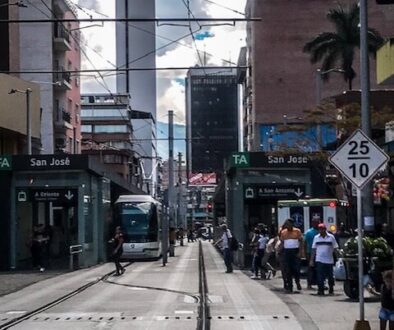What is a Paisa
What is a Paisa?
If you’ve encountered the term “Paisa” in Colombia and are curious about its meaning, rest assured, it’s not some obscure Italian word. Instead, it’s used to characterize a distinctive group of people that inhabit a beautiful mountainous region known as the Paisa Region (in the past there was a time it was called Paisa Nation). Parts of the departments of Antioquia, Caldas, Risaralda and Quindió in the heart of Colombia’s western region make up the Paisa Region, with Antioquia and its capital city Medellin being the most emblematic of the Paisa people.
So, what does it mean to be a Paisa?
It’s akin to peeling the layers of a fascinating onion, with Paisa culture and the emblematic Raza Antioqueña at its core. The Paisas truly stand out in the mosaic of Colombian diversity.
To be candid, people from various regions, no matter their origin, naturally possess unique quirks and characteristics. For Paisas, they’ve crafted a distinct reputation. They’re renowned for their hard work, infectious cheerfulness, boldness, and entrepreneurial spirit. Furthermore, they are considered wily in business like snake oil salesmen, weaving tales with a hint of hyperbole. They are incredibly friendly, proudly bold, unflinchingly courageous, and with very strong family values.
Paisas take pride to a whole new level.
Paisas gush in pride particularly when it comes to their beloved Medellín in the state of Antioquia. They boldly proclaim that they possess the most enchanting, organized, and efficient city, along with the finest weather, the only metro system in the entire country, and the most beautiful women. In their eyes, they’re champions in every category.
Venture beyond Paisa territory, and you may detect a hint of rivalry – at least, that’s how other regions perceive it. To Paisas, there’s simply no competition. The “Rolos” in Bogotá, the “Caleños” from Cali, the “Costeños” along the coast in Cartagena, Barranquilla, and Santa Marta, and even the “Pastusos” from the city of Pasto near the Ecuadorian border all delight in accusing Paisas of living in their own bubble of arrogance, but always with a touch of admiration too.
Where do Paisas come from?
Basque Influence
The early settlers of the Paisa region are said to be from the Basque territory in northern Spain, although there are other influences also from Spain’s Extremadura and Andalucía territories. The Basque settlers are said to be Euskaldunak from the Pyrenees, who came to settle the Paisa region during the Spanish colonization of the Americas (from the 16th to the 18th century).
The evidence supporting this
Surnames:
- The common surnames found amongst Paisas like Echeverri, Uribe, Arango, Zuluaga and Jaramillo reflect the Basque heritage of many Paisa families.
Genetic Studies:
-
Genetic studies have shown that the Paisa population has a significant proportion of European ancestry, with Basque markers being particularly prominent.
- Studies support that the Basques contributed strongly to the region’s gene pool.
The Paisa Jewish Heritage Theory
It is believed that many of the early settlers of the Paisa region where families of what are known as conversos, New Christians, Sephardi Jews that populated and assimilated in Spain for generations and had converted to Catholicism, some achieving very prominent positions in business, government, Church, and even nobility .
The Granada Decree ordering the expulsion of all Jewish people from Spain in 1492.
In 1492, March 31, the monarchs Fernando and Isabel (known as Los Reyes Católicos) issued the Granada Decree or La Alhambra Edict ordering the expulsion of all Jews from the crown regions of Castilla and Aragón, giving them until July 31 to comply. This caused a great upheaval in Spanish society. The Sephardi Jewish population was large and had been living in Spain for many generations, owning property and intrinsically involved in all aspects of society.
The edict ordered all Jews to leave or convert to Catholicism in order to be allowed to stay. Many Jewish families did, like many others before them had done in fear of the the pogroms of the 14th century, and they continued to live in Fernando and Isabel’s Spain. The monarchs wanted one unified Catholic country intolerant of other religions. It is believed that in the 1300’s 200,000 Jews had converted to Catholicism in Spainl
Conversos and Crypto Jews fleeing the Inquisition
Settlers of the Paisa territory
In 1478, by request of the monarchs of Spain Fernando and Isabel the Catholics, pope Sixto IV conceded the papal bull establishing the Inquisition in Spain. In 1480 the first inquisitors arrived in Sevilla to begin investigating the conversos, those who had converted from Judaism to Catholicism and assimilated into Spanish society starting from 1391 when pogroms against Jewish communities started and many were killed, for being suspect of continuing to secretly practice the Jewish faith. These were called Crypto Jews.
According to Inquisition records, from 1481 to 1524, five-thousand people were burned at the stake in Spain.
Paisas are known for being ultra Catholic, more conservative and practicing than the rest of the country. This is said to be because they are descendants of converso families that emigrated en masse to the Spanish Colonies and settled in the Paisa region to get away from the Spanish Inquisition. They feared the Inquisition because no matter how long ago their families had converted and how prestigious and influential they were and how fervent and how much they went overboard in displaying their Catholicism (many being Catholic priests themselves) they would always be suspect of being Crypto Jews and never knew when they would be next to be investigated and sent to the pyre and have all their property confiscated by the Church.
Converso families in Spain developed traditions to show they were very fervent and made sure they were very public about their Catholic faith in the attempt to keep the Inquisition at bay. Some of these traditions are reflected to this day among traditional Paisas in Colombia, for example, you will always find in old traditional Paisa homes very large crosses and religious paintings that must be in view from the street through open doors and windows.
The yearly pork-roast, the marranada, a tradition to keep the Inquisition away
Another Paisa tradition that is attributed to their converso heritage is the yearly pork-roast during Christmas time, the marranada. Colombians take Christmas very seriously, and they begin to celebrate the Christmas season from the very first day of December –with a lot of partying mostly. Things almost come to a standstill in Colombia in December, not much really gets done.
Paisas have their traditional pork-roasts celebration. Come December, every day of the week some family has a marranada that must be attended to. These are big social occasions. Tuesday it could be at the Jaramillo’s, Thursday you’ll have an invitation to the Restrepo’s marranada, Saturday another one, and so on throughout all of December. These celebrations are never done indoors. Traditionally they are held outside the family’s residence, out in the street, where the animal was slaughtered on the curb (this part has now been outlawed for the obvious sanitary reasons) where all acquaintances, neighbors and random passersby are invited to partake and eat themselves as much pig as they can gobble. A tradition that is said to come from when converted families that lived in Spain wanted to make sure the Inquisition knew they ate pork, something that is explicitly forbidden by Jewish laws.
In conclusion, the Paisa people are
a distinctive group whose identity is deeply rooted in their particular cultural traits and tradition. From their Basque and Spanish origins to the intriguing theories of Sephardic heritage, the Paisas have a unique place in Colombia’s diverse cultural landscape. Their reputation for hard work, entrepreneurial spirit, and unwavering pride in their region—especially their beloved Medellín—sets them apart. Yet, it is their deep-seated family values, their fervent Catholicism, and their enduring traditions, like the marranada, that truly define the essence of being Paisa. Whether viewed with admiration or a touch of rivalry by the rest of Colombians, the Paisas remain a fascinating and integral part of Colombia’s national identity, embodying a legacy of resilience, creativity, and unshakable pride.





